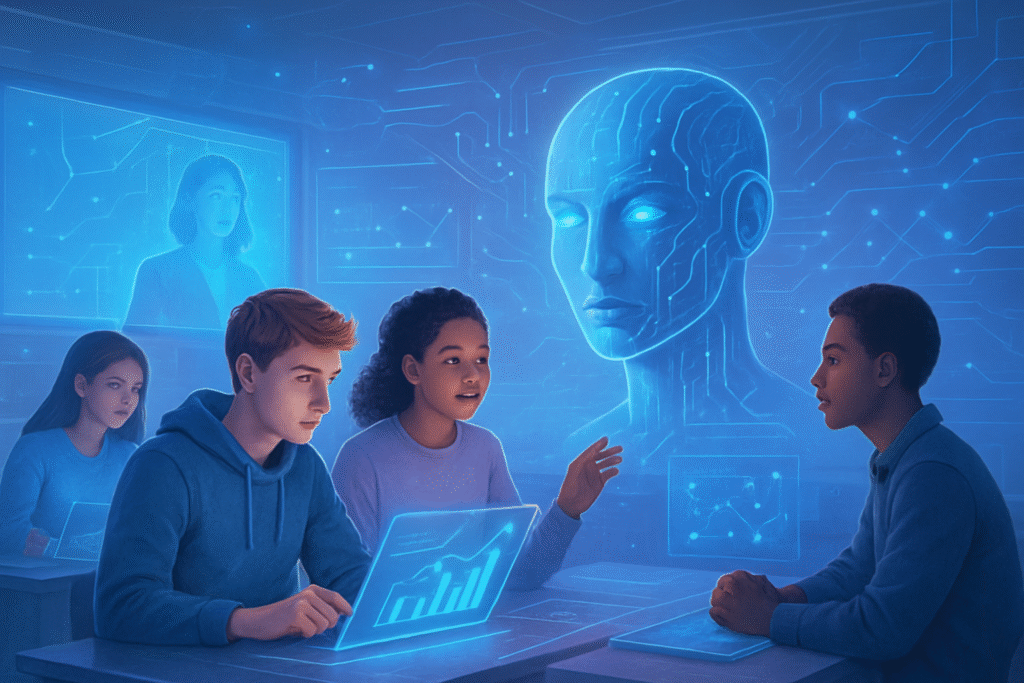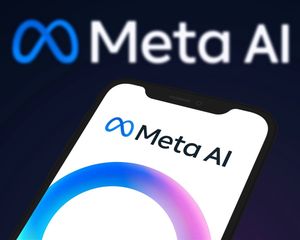
Herkimer, NY – November 7, 2025 – In a significant move signaling a proactive response to the escalating demand for artificial intelligence (AI) expertise in the business world, Herkimer County Community College (Herkimer College) is set to launch a groundbreaking Artificial Intelligence – Business Associate in Applied Science (A.A.S.) Degree Program. This new offering, reported by WKTV today, is poised to equip students with a unique blend of AI knowledge and strategic business acumen, preparing them for pivotal roles in an economy increasingly shaped by intelligent technologies.
The introduction of this specialized degree program underscores a critical shift in higher education, as institutions worldwide recognize the urgent need to bridge the growing skills gap in the AI sector. Herkimer College's initiative directly addresses the global marketplace's demand for professionals capable of not only understanding complex AI concepts but also adept at integrating these technologies into practical business strategies to drive innovation and efficiency.
Herkimer's AI-Business Degree: A Deep Dive into a Future-Focused Curriculum
Herkimer College's new AI-Business A.A.S. program is meticulously designed to cultivate a generation of professionals who can navigate the intricate intersection of AI and commerce. The curriculum offers a robust foundation in core AI concepts, machine learning, big data analytics, and the crucial ethical considerations that underpin responsible AI deployment. While specific course names were not detailed, the program's learning outcomes highlight its comprehensive nature.
Graduates of the program will be uniquely positioned to identify and analyze information across diverse business functions and industries, translating complex data into strategic insights. They will master the application of critical thinking and data-driven analysis to demonstrate AI's tangible impact on achieving business objectives. Furthermore, students will gain proficiency in utilizing advanced analytical and AI tools for extracting, interpreting, and leveraging data for strategic decision-making, a skill set paramount in today's data-rich environment. This practical, hands-on approach ensures that students are not just theoretically aware of AI but are capable of its real-world application.
This program significantly differentiates itself from traditional business or IT degrees by its integrated focus. Unlike traditional Business Administration A.A.S. or A.S. programs, which offer a broad overview of general business operations, Herkimer's AI-Business degree delves specifically into how AI influences and can be leveraged within these functions. Similarly, it diverges from purely technical IT degrees, such as Computer and Network Security A.A.S. programs, by emphasizing the strategic application and analytical interpretation of AI within a business context, rather than solely focusing on the foundational IT infrastructure. The program aims to produce "AI-Business Translators" – individuals who can effectively bridge the gap between AI technologies and tangible business value, preparing them for immediate entry into roles such as AI Analyst, Data Science Analyst, Machine Learning Data Scientist, AI Trainer, and Labeling Specialist.
Reshaping the Corporate Landscape: AI Education's Impact on Industry
The emergence of specialized AI education programs like Herkimer College's AI-Business Degree is poised to have a profound and far-reaching impact across the corporate landscape, benefiting AI companies, tech giants, and innovative startups alike. A more AI-literate workforce directly translates into enhanced innovation, accelerated product development, and improved operational efficiencies across all sectors.
Companies such as Alphabet (NASDAQ: GOOGL), Microsoft (NASDAQ: MSFT), and Amazon (NASDAQ: AMZN), already at the forefront of AI development, stand to gain immensely. These tech giants, who actively invest in both internal and external AI literacy initiatives, will find their talent pipelines strengthened, fostering a broader ecosystem of AI-savvy users and developers for their platforms and services. For dedicated AI companies and burgeoning startups, a steady supply of graduates capable of translating technical AI capabilities into actionable business value is critical for rapid prototyping, iteration, and market disruption. This specialized talent can mean the difference between conceptual AI solutions and commercially viable products.
Beyond the traditional tech sector, industries ranging from finance and manufacturing to healthcare and retail will experience significant competitive implications. Financial institutions, for example, can better leverage AI for fraud detection and risk assessment with AI-literate employees. Manufacturing firms can optimize supply chains and implement predictive maintenance with staff who understand AI-driven analytics. Consulting firms like KPMG and pharmaceutical giants like Merck (NYSE: MRK) are already investing heavily in generative AI training for their workforces, recognizing that AI fluency is becoming a new "competitive moat." Companies that embrace an "AI-first" mandate, like Shopify (NYSE: SHOP), demonstrate how an AI-literate workforce can lead to significant cost reductions and accelerated product development, thereby gaining a substantial competitive advantage. Conversely, organizations neglecting AI literacy risk falling behind, struggling to adopt new tools, attract top talent, and effectively manage the ethical and operational risks associated with AI deployment.
A Broader Canvas: AI Education in the Global Context
Herkimer College's new AI-Business Degree program is not an isolated event but a microcosm of a much larger, global trend in education and workforce development. This trend reflects the pervasive integration of AI across nearly every industry, signaling a societal shift comparable to, and in some aspects more rapid than, previous technological revolutions like the Industrial Revolution or the advent of the internet. The broader AI landscape is defined by an unprecedented demand for interdisciplinary AI skills, moving beyond purely technical roles to encompass professionals who can strategically apply AI in diverse fields.
This educational evolution addresses several critical societal impacts. While AI is poised to displace jobs involving routine tasks, particularly in sectors like customer service and data entry, it is simultaneously a powerful engine for job creation, fostering new roles such as AI ethicists, data scientists, and AI trainers. The World Economic Forum predicts a net gain in jobs by 2027, underscoring the transformative nature of this shift. However, this transformation also raises concerns about potential job displacement, the exacerbation of skill gaps, and the risk of widening economic inequality if equitable access to quality AI education is not ensured. Ethical considerations surrounding algorithmic bias, data privacy, and the responsible deployment of AI systems are paramount, necessitating robust governance and comprehensive ethical training within these new curricula.
Compared to past technological shifts, the AI revolution is unique in its pervasive and accelerated impact. While the internet primarily augmented white-collar productivity, AI, particularly with large language models, is poised to affect a much broader spectrum of occupations, including knowledge workers. This demands a fundamental re-evaluation of pedagogical approaches, shifting from rote learning to cultivating "durable skills" like creativity, critical thinking, and ethical reasoning that AI currently lacks. The ethical complexities introduced by AI, such as autonomous decision-making and algorithmic bias, are arguably more profound than those presented by previous technologies, making ethical AI education a non-negotiable component of modern curricula.
The Horizon: Future Trajectories of AI Education and Workforce Development
The trajectory of AI education and workforce development, exemplified by pioneering programs like Herkimer College's AI-Business Degree, points towards a future characterized by highly personalized learning, continuous skill adaptation, and a significant redefinition of professional roles. In the near term, AI will increasingly power adaptive learning platforms, tailoring educational content and instructional methods to individual student needs, while simultaneously automating administrative tasks for educators, freeing them to focus on mentorship and complex pedagogical challenges. The direct integration of AI tools into curricula will become standard, enhancing students' capabilities in data analysis and innovation.
Looking further ahead, the long-term landscape will necessitate a paradigm of continuous learning, as technical skills are expected to have an average shelf life of less than five years. This will redefine the role of educators, who will evolve into "AI administrators," guiding students in effectively leveraging and critically assessing AI tools. The democratization of learning through AI will make personalized education, tutoring, and mentorship accessible to a broader global audience. Furthermore, traditional assessment methods will likely give way to evaluations that AI cannot easily replicate, such as project-based learning and oral examinations, while "soft skills" like creativity, critical thinking, and empathy will experience a resurgence in value as AI automates more technical tasks.
Potential applications stemming from an AI-literate workforce are vast, ranging from enhanced productivity and efficiency through automation to vastly improved, data-driven decision-making across all business functions. AI will enable personalized employee development and foster new job creation in areas such as AI ethics and human-AI collaboration. However, significant challenges remain, including managing job displacement, closing the existing skills gap, addressing ethical concerns like algorithmic bias, and ensuring equitable access to AI education to prevent widening societal inequalities. Experts predict a future where AI acts as a collaborative tool, fostering "discovery-based learning" and supporting human-like AI tutors. The emphasis will shift towards AI-complementary skills and the development of robust ethical frameworks and policies to guide AI's responsible integration into society.
A New Era of Learning: The Enduring Significance of AI Education
The launch of Herkimer College's AI-Business Degree Program stands as a powerful testament to the transformative power of AI education and workforce development in the 21st century. It encapsulates a strategic imperative to prepare individuals and societies for an era where artificial intelligence is not merely a tool but an integral partner in driving progress and innovation. This development is a key takeaway, highlighting the critical need for interdisciplinary programs that blend technical AI expertise with essential business acumen and ethical considerations.
In the grand narrative of AI history, this moment signifies a crucial shift from simply using technology in education to fundamentally educating for a technological future. Unlike earlier iterations of AI in education, current initiatives are designed to equip a workforce capable of interacting with, developing, and ethically managing complex AI systems across entire industries. The long-term impact will resonate across economic resilience, with nations and economies investing in AI literacy positioned for greater growth. The job market will continue its evolution, demanding roles that combine domain-specific expertise with deep AI understanding. Education itself will be perpetually transformed, becoming more personalized, accessible, and adaptive, while simultaneously fostering the uniquely human skills that complement AI capabilities.
As we look ahead, several key aspects demand close observation. The evolution of governmental and institutional policies on ethical AI use, data privacy, and authorship will be paramount. Educational institutions must remain agile, continuously updating curricula and fostering strong industry-academia partnerships to ensure relevance. The integration of "soft skills" and ethical training into technical curricula will be a vital indicator of educational systems adapting to human-AI collaboration. Finally, global initiatives aimed at expanding AI education to underserved populations will be crucial in ensuring that the benefits of this technological revolution are shared equitably. Herkimer College's initiative serves as a vital blueprint for how educational institutions can proactively shape a future where humans and intelligent machines collaborate to solve the world's most pressing challenges.







